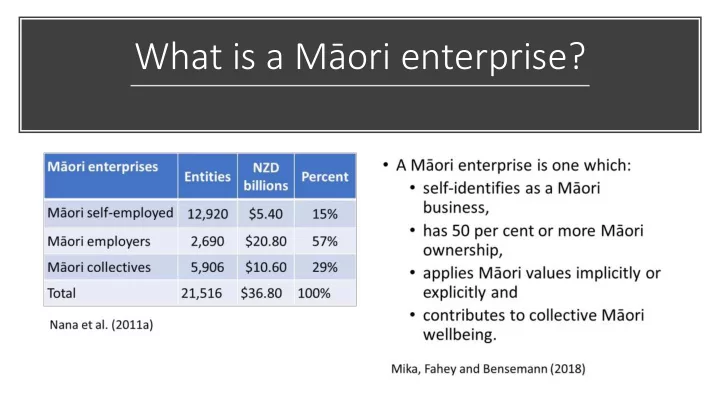

What is a Māori enterprise?
Economy
• An economy is a system • Māori economy is What is an of actors (organisations, highly integrated economy? institutions, individuals withy the New etc) which interacts to Zealand economy produce and distribute • Structure, dynamics goods and services. and institutions of the • Economies traditionally Māori economy are have a geography, not well defined. governance systems, • Māori view economy institutions and an asset as integrating human, base. social, cultural, environmental and spiritual dimensions 21
“the assets owned and income earned by Māori – including collectively-owned trusts and incorporations, Māori -owned businesses (e.g., tourism, broadcasting, and the self-employed), service providers (especially in health and education), and the housing owned by Māori [and the] wages and salaries earned by Māori workers.” What is the Māori (NZIER, 2003, p. 7) economy? 20-Aug-20 22
Māori economy: Selected literature
Is Māori economic growth sufficient? 20-Aug-20 24
Sustainable development
Treaty of Waitangi Feb 6, 1840 20-Aug-20 26
The rights of Indigenous peoples 20-Aug-20 27
Sustainable development Environmental development Social Economic development development
Policy context
• In theory • In practice • Non-neutral (hands-on) • There is a role for Role of policy government • Neutral (hands-off) policy • Provider-funder split government in remains • Private-public good enterprise elements • Rationale for Māori • Evidence of market assistance assistance failure • Rights-based (treaty) • Benefits outweigh costs • Equity-based • Evidence intervention will (disparities) work • Efficiency-based • National or local support (efficacy) • Objective or subjective • Growth-based exchange (outputs)
Māori marine economy
Māori agribusiness
Māori tourism
• Indigenous entrepreneurship expression of self- development • This occurs within a development context and process • Balancing cultural and commercial imperatives is a key challenge • Sustainable development relies on managerialism Conclusion and efficiency • No satisfactory principle exists to balance tensions in sustainability • Māori entrepreneurs are developing kaitiaki business models • Role of government is to support indigenous entrepreneurs to be self-determining and sustainable.
Recommend
More recommend